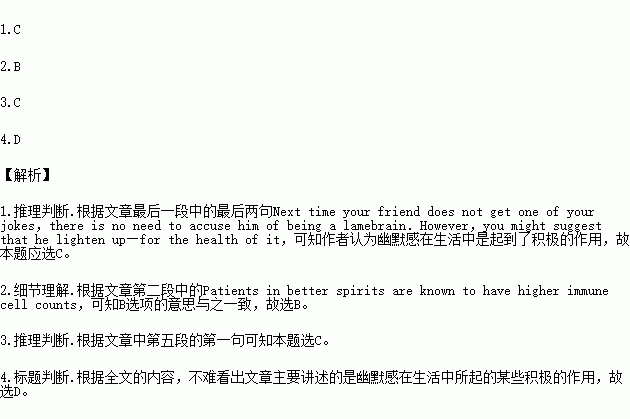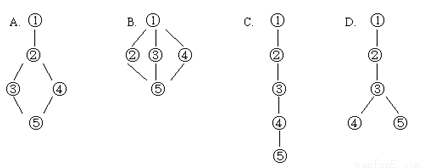题目内容
Patients and doctors alike have long believed in the healing (治疗) power of humor.It is claimed that humor not only affects patients’ moods,but can actually help them recover faster.
Several studies seem to support this.Patients in better spirits are known to have higher immune cell counts.Some have even claimed to have healed themselves of serious illnesses by reading comics and watching comedies.
Despite all this,many researchers are not convinceD. They point out the fact that many sufferings have been known to disappear naturally,with or without a daily dose of laughter.They also say that while optimism in general does seem to be related to better health,it is hard to tell which comes first.
Humor in times of stress,however,clearly makes us feel better.On one level,it takes our minds off our troubles and relaxes us.On another,it releases powerful endorphins,a chemical produced by your body that reduces pain.
There are cases where the appreciation of a good joke is indeed directly related to a person’s health.It can show,for example,whether a person has suffered damage to one particular area of the brain: the right frontal lobe (额叶).
Scientists confirmed this by having people read jokes and asking them to choose the funniest endings from a list.Subjects with normal brains usually chose endings that were based on a relatively complex synthesis (综合) of ideas.Subjects with specifically located brain damage,however,responded only to slapstick (闹剧) endings,which did not depend on a particular context.When pressed,the brain-damaged subjects saw the logic in the correct endings.They simply did not find them funny.
Of course,humor is largely an individual matter.Next time your friend does not get one of your jokes,there is no need to accuse him of being a lamebrain.However,you might suggest that he lighten up—for the health of it.
1.We can infer from the passage that ________.
A. all researchers have agreed on the healing power of humor
B. people seldom accuse their friends of not understanding jokes
C. the author holds a positive attitude to the healing power of humor
D. reading comics will surely become a popular way of treating diseases
2.Which of the following statements is NOT true?
A. Many researchers are not convinced of the healing power of humor.
B. Patients in bad moods are known to have higher immune cell counts.
C. Optimism in general does seem to be related to better health.
D. People should try their best to cheer up for their good health.
3.Scientists had some people read jokes and asked them to choose the funniest endings from a list to confirm that ________.
A. the brain-damaged people are different from those with normal brains
B. a person with a normal brain usually responds to slapstick endings
C. a person suffering certain brain damage doesn’t appreciate a good joke
D. humor takes our minds off our troubles by releasing powerful endorphins
4.Which would be the best title for the passage?
A. Which comes first,humor or health?
B. Humor can cure different illnesses
C. People need humor in times of stress
D. Humor contributes to good health


